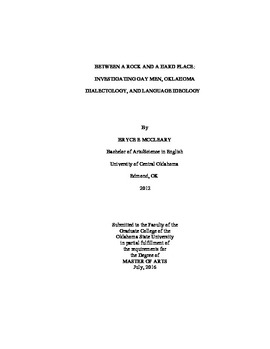| dc.description.abstract | This thesis, unlike any previous research I am aware of, maps the vowels systems of gay men in Oklahoma, and in doing so, attempts to draw implications for stylistic variation across tasks in its comparison with other, non-gay Oklahomans. Through the use of acoustic measurements, it takes the production of speech, across different tasks, and compares the results with other previously collected data, and then again in congruence with the respondents own attitudinal data from interviews. The bigger picture this work attempts painting is the intricate and intimate relationships between language attitudes, ideas of gay people, and ideas of Oklahomans held by these gay men — and most crucially, how those interact with the variation in their own speech. What it found, then, was that gay Oklahomans often displayed more advanced characteristics of Oklahoman speech in situations/tasks (i.e. a word list, a reading passage, and a sociolinguistic interview) that, according to older research, might have expected more conservative speech, a pattern believed to be related to their beliefs about OK language, culture, and expectations for gender and for sexual minorities.After looking at the ways they described their experiences in OK, two things became clear: many of these gay men describe Oklahoman culture as one that praises a singular, strictly hyper-masculine model for men within the state; and secondly, that gay men are thought of as inherently less masculine — even in the minds of some of the respondents. What results from this is the recognition of unreal societal expectations for a masculine performance, which coincides with the fear of negative consequences for sounding “too gay” or “too feminine.” As this masculine expectation is often described in terms of Oklahoman identity, and thus embodied by Oklahoman speech, they are trapped. They are unable to fully participate in a masculine Oklahoman speech; and while other young people can participate in self-identification with peer groups, these gay men tell their stories of having to mask, hide, or monitor just how “gay” they sound. | |
